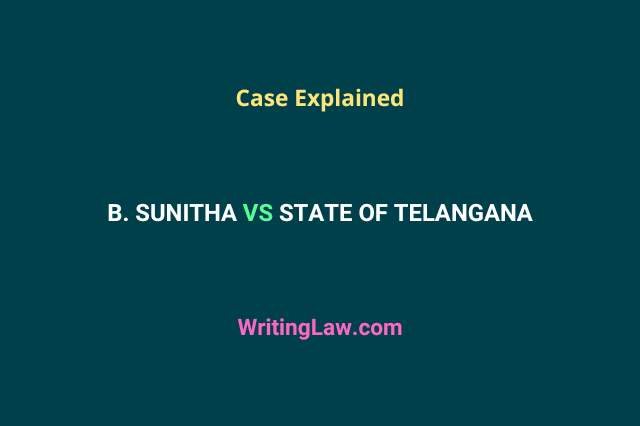
B. Sunitha vs The State of Telangana, (2018) 1 SCC 638
Criminal Appeal No. 2068 OF 2017
(Arising out of Special Leave Petition (CRL.) NO.10700 OF 2015)
Date of Judgment: 5 December 2017
- Court Name: Supreme Court of India
- Case Name: B. Sunitha vs The State of Telangana
- Citation: (2018) 1 SCC 638
- Case No.: Criminal Appeal No. 2068 of 2017
- Appellant: B. Sunitha
- Respondent: The State of Telangana
- Bench: Justice Adarsh Kumar Goel
- Acts Applied: Section 138 of Negotiable Instruments Act, 1881 and Section 23 of Indian Contract Act, 1872
This case law discusses a Supreme Court judgment involving B. Sunitha and the State of Telangana, addressing issues related to dishonoured cheques, advocate fees, professional ethics, and fiduciary relationships.
Introduction
This case relates to an appeal filed in the Supreme Court of India against the High Court of Judicature order at Hyderabad. The appellant, B Sunitha, sought the quashing of proceedings initiated against her under section 138 of the Negotiable Instruments Act of 1881. The main issue in the case was whether the appellant was liable under section 138 for issuing a dishonoured cheque to her advocate as a fee.
Facts
The appellant’s (B. Sunitha’s) husband had died in a motor accident, and she, her children, and her parents filed a claim before the Motor Accident Claims Tribunal (MACT). The MACT awarded compensation, and the appellant paid a sum of Rs. 10 lakhs towards the advocate’s fee on various dates. However, the advocate forced the appellant to sign another cheque of Rs. 3 lakhs, despite stating that she had no funds in her account. The appellant alleged that the transaction was void under section 23 of the Indian Contract Act, 1872, as it abused position and the fee claim was unethical.
Issues
- Whether the issuance of the dishonoured cheque constituted an offence under section 138 of the Negotiable Instruments Act.
- Whether the fee claimed by the advocate, based on a percentage of the decretal amount, was against professional ethics and public policy.
- Whether the burden to prove the contract of the fee was on the advocate or the client in case of a dispute.
Arguments
The appellant argued that charging a percentage of the decretal amount as an advocate’s fee was against section 23 of the Indian Contract Act, professional ethics, and public policy. She contended that the issuance of the dishonoured cheque did not establish a legally enforceable debt and that it was an exploitation of the fiduciary relationship between an advocate and a client. The appellant also claimed that the burden of proof regarding the reasonableness and voluntariness of the fee agreement lay with the advocate.
The respondent advocate argued that the appellant had agreed to pay the professional fee and had availed his services, thus making her liable for the fee. He maintained that there was no legal bar to his fee claim and cited examples of engaging other senior advocates and paying substantial amounts for their services.
Judgment
The Supreme Court held that charging a fee based on a percentage of the decretal amount was against professional ethics and public policy. The court observed that the advocate-client relationship is highly fiduciary, and the advocate is in a position of trust. Mere issuance of a cheque does not establish a legally enforceable debt, and the advocate must independently prove the existence of a contract. Accordingly, the court quashed the proceedings initiated against the appellant under section 138 of the Negotiable Instruments Act.
Principles Laid Down in the Case
B Sunitha vs the State of Telangana case highlighted these points:
- Charging a fee based on a percentage of the result of litigation is against professional ethics and public policy.
- Mere issuing a cheque does not create a presumption of a legally enforceable debt in favour of the advocate.
- The burden of proving the contract of fee lies with the advocate if the client disputes the quantum of the fee.
- The advocate-client relationship is fiduciary in nature, and advocates should uphold professional ethics.
Must Read: 41 Duties of an Indian Advocate
Conclusion
The Supreme Court quashed the proceedings against the appellant initiated under section 138 of the Negotiable Instruments Act. However, it highlighted the issue of professional misconduct and stated that it should be dealt with at an appropriate forum. In addition, the court emphasized the importance of upholding professional ethics in the legal profession to administer justice properly.
Read Next: Rights of an Advocate or a Lawyer
- What Is the Burden of Proof Under the PMLA? - 18th April 2024
- Ranjit D Udeshi vs State of Maharashtra – Case Explained - 11th April 2024
- What Is Proceeds of Crime Under PMLA (With Case Laws) - 7th April 2024







